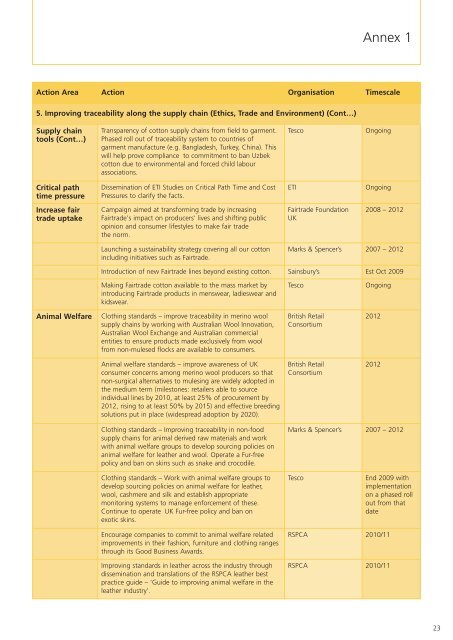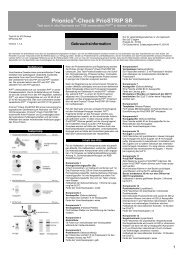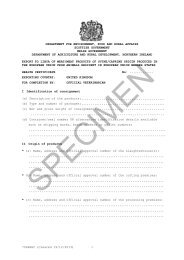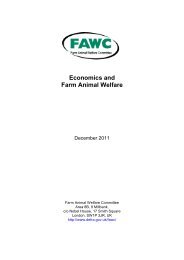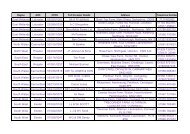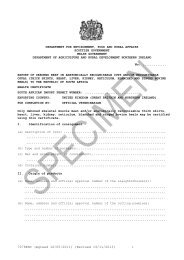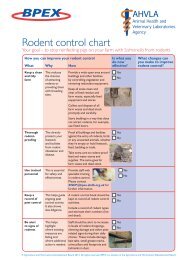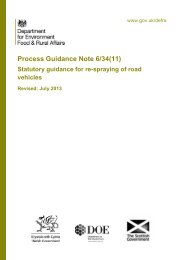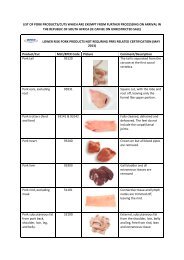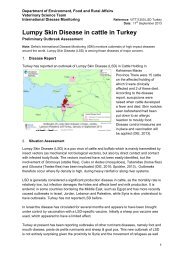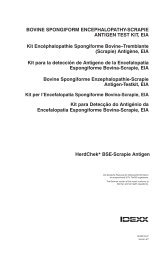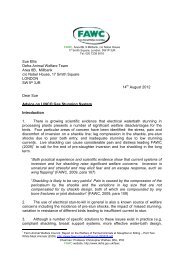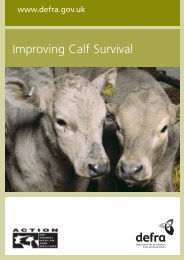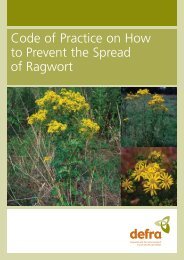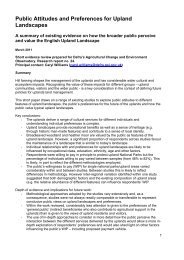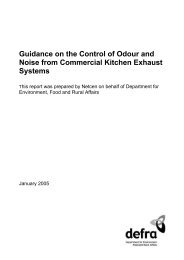SUSTAINABLE CLOTHING ACTION PLAN - Defra
SUSTAINABLE CLOTHING ACTION PLAN - Defra
SUSTAINABLE CLOTHING ACTION PLAN - Defra
You also want an ePaper? Increase the reach of your titles
YUMPU automatically turns print PDFs into web optimized ePapers that Google loves.
Annex 1<br />
Action Area Action Organisation Timescale<br />
5. Improving traceability along the supply chain (Ethics, Trade and Environment) (Cont…)<br />
Supply chain<br />
tools (Cont…)<br />
Critical path<br />
time pressure<br />
Increase fair<br />
trade uptake<br />
Transparency of cotton supply chains from field to garment.<br />
Phased roll out of traceability system to countries of<br />
garment manufacture (e.g. Bangladesh, Turkey, China). This<br />
will help prove compliance to commitment to ban Uzbek<br />
cotton due to environmental and forced child labour<br />
associations.<br />
Dissemination of ETI Studies on Critical Path Time and Cost<br />
Pressures to clarify the facts.<br />
Campaign aimed at transforming trade by increasing<br />
Fairtrade's impact on producers' lives and shifting public<br />
opinion and consumer lifestyles to make fair trade<br />
the norm.<br />
Launching a sustainability strategy covering all our cotton<br />
including initiatives such as Fairtrade.<br />
Tesco Ongoing<br />
ETI Ongoing<br />
Fairtrade Foundation<br />
UK<br />
2008 – 2012<br />
Marks & Spencer’s 2007 – 2012<br />
Introduction of new Fairtrade lines beyond existing cotton. Sainsbury’s Est Oct 2009<br />
Making Fairtrade cotton available to the mass market by<br />
introducing Fairtrade products in menswear, ladieswear and<br />
kidswear.<br />
Animal Welfare Clothing standards – improve traceability in merino wool<br />
supply chains by working with Australian Wool Innovation,<br />
Australian Wool Exchange and Australian commercial<br />
entities to ensure products made exclusively from wool<br />
from non-mulesed flocks are available to consumers.<br />
Animal welfare standards – improve awareness of UK<br />
consumer concerns among merino wool producers so that<br />
non-surgical alternatives to mulesing are widely adopted in<br />
the medium term (milestones: retailers able to source<br />
individual lines by 2010, at least 25% of procurement by<br />
2012, rising to at least 50% by 2015) and effective breeding<br />
solutions put in place (widespread adoption by 2020).<br />
Clothing standards – Improving traceability in non-food<br />
supply chains for animal derived raw materials and work<br />
with animal welfare groups to develop sourcing policies on<br />
animal welfare for leather and wool. Operate a Fur-free<br />
policy and ban on skins such as snake and crocodile.<br />
Clothing standards – Work with animal welfare groups to<br />
develop sourcing policies on animal welfare for leather,<br />
wool, cashmere and silk and establish appropriate<br />
monitoring systems to manage enforcement of these.<br />
Continue to operate UK Fur-free policy and ban on<br />
exotic skins.<br />
Encourage companies to commit to animal welfare related<br />
improvements in their fashion, furniture and clothing ranges<br />
through its Good Business Awards.<br />
Improving standards in leather across the industry through<br />
dissemination and translations of the RSPCA leather best<br />
practice guide – ‘Guide to improving animal welfare in the<br />
leather industry’.<br />
Tesco Ongoing<br />
British Retail<br />
Consortium<br />
British Retail<br />
Consortium<br />
2012<br />
2012<br />
Marks & Spencer’s 2007 – 2012<br />
Tesco End 2009 with<br />
implementation<br />
on a phased roll<br />
out from that<br />
date<br />
RSPCA 2010/11<br />
RSPCA 2010/11<br />
23


